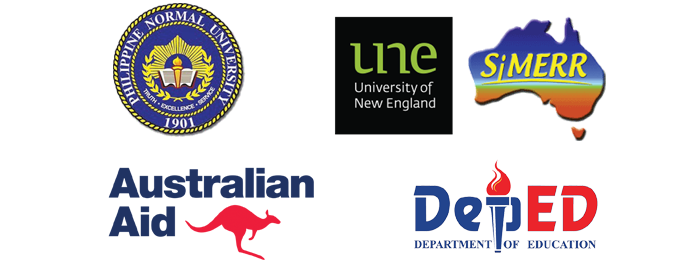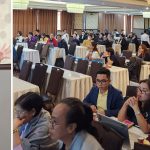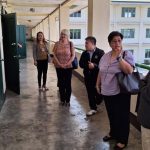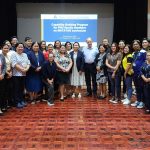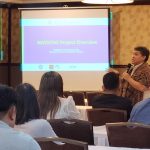Guiding Teachers on the Practical Implications of the Science of Learning
By Donnadette Belza, RCTQ Project Officer
In a recent gathering of educational leaders at The Linden Suites, Pasig City, the question echoed through the room: What is most important in learning success?
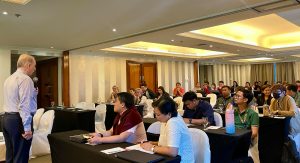
Dr. John Pegg speaks before leaders of various Department of Education bureaus at the Capacity Building of DepEd Bureaus on the MATATAG Curriculum last February 1-2 .
Dr. John Pegg, the Director of the University of New England (UNE) SiMERR National Research Center and RCTQ Co-Director, provided a thought-provoking answer during the Capacity Building of DepEd Bureaus on the MATATAG Curriculum on 1-2 February 2024.
The answer, he said, lies in understanding where the learners currently are in their educational journey. This response is based on cognitive research in education and represents the practical implications of this research.
The ‘science of learning,’ which synthesizes extensive research from cognitive science/psychology, neuroscience, and education, forms the foundation of this understanding. The aim is to bridge the gap between what we know about how humans learn and the impact it can have on teaching and learning practices (Deans for Impact, 2015; The Education Hub, n.d.).
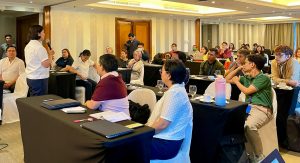
DepEd Undersecretary for Curriculum and Teaching Dr. Gina Gonong welcomes participants at the Capacity Building of DepEd Bureaus on the MATATAG Curriculum.
RCTQ and its partner UNE SiMERR began explicitly integrating the science of learning in the Department of Education (DepEd). This integration is evident in two significant ways: firstly, as the guiding framework for developing the learning materials for the National Learning Camp 2023 and the MATATAG curriculum, and secondly, in the subsequent capacity-building initiatives for DepEd personnel involved in these groundbreaking projects. The combination of advanced research and practical application represents a significant change in educational methods. It goes beyond traditional approaches to embrace strategies that are based on how the human mind processes and remembers information. The practical effects of the science of learning have the potential to revolutionize classrooms in the future.
It is essential for teachers and education policymakers to understand how learners learn and apply these principles in the school context. This includes designing the curriculum, using effective pedagogical approaches, and creating an environment that supports learning.
How are quality teachers guided by the science of learning?
Quality teachers understand that the most important in learning success is knowing where the learners are. The science of learning says that effective learning occurs when teachers build on what students already know and expand their prior knowledge and experiences (Darling-Hammond et al, 2020; Deans for Impact, 2015). Doing this is understanding both working memory and long-term memory in terms of the learning process.
Working memory is where thinking takes place, where new information is connected with information from the long-term memory, and where both are manipulated (Furst, 2021a). The way learners engage with information in the working memory affects how this will be stored in the long-term memory.
In this sense, quality teachers think developmentally and are conscious of the working-memory demands of the material they present. Quality teachers monitor their learners against some form of learning progression, and use this information to adjust the direction and level of their teaching according to what learners already know.
Teachers also have to be careful with ‘cognitive load’ or limitations in the capacity of the working memory. Overwhelming students with tasks that are cognitively too demanding or overloading them with information at once may impede new learning (Deans for Impact, 2015).
Quality teachers provide learners opportunity to practice skills and ideas for greater memory retention. In neuroscience, learning is about establishing neural networks in the brain. Psychologist Donald Hebb proposed that when two neurons fire together, sending off impulses simultaneously, the connections between them called the ‘synapses’ grow stronger (Fields, 2020). Strong neural networks develop when nerve impulses move efficiently between neurons, resulting in improved memory recall and memory utilization. Understanding how the brain works, quality teachers are able to structure student learning accordingly and help them develop study habits that will allow greater memory retention.
In class, quality teaching provides opportunities for learners to expend effort on practice of ideas and skills. There are a number of techniques, involving practice, that promote better retention and recall such as spaced practice, testing effect, and interleaving (Harvard University The Derek Bok Center for Teaching and Learning, 2024).
Spaced practice, or distributed practice, is built on the idea that practicing a skill or reviewing content is more effective when spread over time as opposed to doing it multiple times at once. This helps learners retain information over the long-term. Memories decay and become less accessible so by learning something over a period of time, learners reconstruct information and the pathways that lead to it so information becomes more accessible (Furst, 2021b). This has implications on learner’s study habits and teacher’s planning of the lesson. Cramming study is not effective for long-term memory retention, the same way as teaching a lesson in one go.
The testing effect refers to the process of actively and frequently testing memory retention when learning new information. In class, asking learners to retrieve information repeatedly through low- or no-stakes quizzes can help them retain information in long-term memory. Teachers can also encourage learners to ‘quiz’ themselves as part of their study habits.
Interleaving occurs when learners practice multiple related skills at a given time. In class, learning is more effective when learners alternate practice different types of mathematical operations rather than one type of operation at once.
Quality teachers work to improve their own practice, those of their peers and what the school offers their students, as a community of practice. Positive adult relationships can support student development and welfare (Darling-Hammond et al, 2020). Students perform better in schools who encourage and facilitate their staff to work collaboratively with their peers to enhance their own teaching and that of their colleagues. The aim is to ensure all students within a school obtain an acceptable level of instruction, and, as a result, reduce with-in school student-learning variation.
Quality teaching can be promoted by three ideas evidenced by quality teachers:
- Knowing their subject and how it can be taught, and where to start;
- Using knowledge of how the brain learns to guide teaching approaches to support student learning; and
- Working to establish and utilize collaborative expertise to facilitate greater coherence in learning across their school.
How do professional standards for teachers cover the science of learning?
The Philippine Professional Standards for Teachers (PPST), developed by RCTQ for DepEd, outlines what is expected of teachers in terms of their knowledge, practice, and professional engagement. One of the expectations is that teachers should use research-based knowledge and principles of teaching and learning to enhance their practice (PPST strand 1.2). Furthermore, RCTQ believes that high-quality teachers should continuously use developmentally appropriate and meaningful pedagogy based on current research on how learners think and learn. They should also be able to recognize common misconceptions of cognitive science related to teaching and learning (Deans for Impact, 2015).
References
Darling-Hammond, L., Flook, L., Cook-Harvey, C., Barron, B., & Osher, D. (2020). Implications for educational practice of the science of learning and development. Applied Developmental Science, 24(2), 97-140. https://doi.org/10.1080/10888691.2018.1537791
Deans for Impact. (2015). The science of learning. Texas: Deans for Impact. https://www.deansforimpact.org/files/assets/thescienceoflearning.pdf
Fields, R.D. (2020). The brain learns in unexpected ways. Scientific American. https://www.scientificamerican.com/article/the-brain-learns-in-unexpected-ways/
Furst, E. (2021a). Working memory and its role in teaching and learning. The Education Hub. https://theeducationhub.org.nz/working-memory-and-its-role-in-teaching-and-learning/
Furst, E. (2021b). Spaced practice and its role in supporting learning and retention. The Education Hub. https://theeducationhub.org.nz/spaced-practice-and-its-role-in-supporting-learning-and-retention/
Harvard University The Derek Bok Center for Teaching and Learning. (2024). The science of learning. https://bokcenter.harvard.edu/science-learning
https://www.rctq.ph/?p=4806FeatureMATATAG,PPST,Science of Learning

